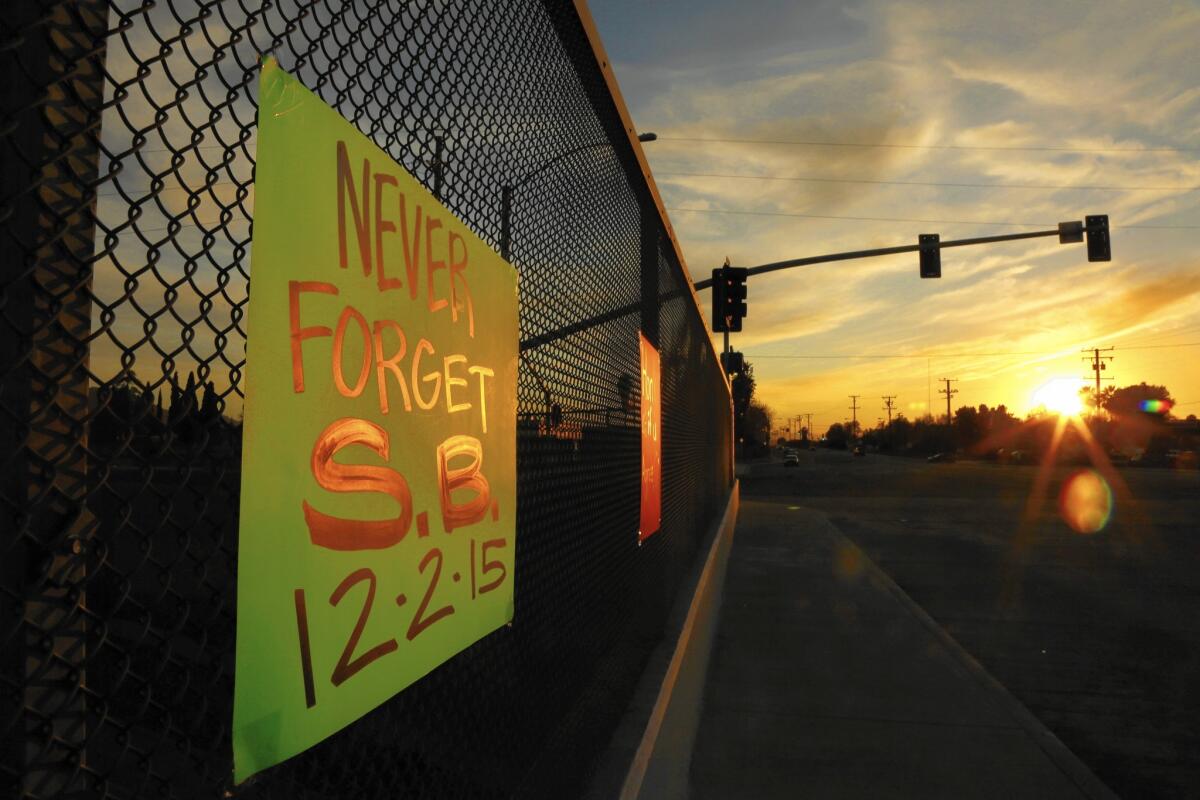Inquiry into San Bernardino attack looks for radicalism roots

One of several signs supporting the city of San Bernardino hangs above the 215 Freeway on Dec. 6.
- Share via
reporting from washington — Federal authorities continued Sunday to scour the backgrounds of the assailants in the San Bernardino shootings to determine what sparked their radical turn and whether they received any outside financial support to carry out the deadliest terrorist attack on U.S. soil since 9/11.
U.S. Atty. Gen. Loretta Lynch said that investigators conducted more than 300 interviews and had gained the cooperation of foreign governments, including Pakistan, as part of the far-reaching probe of Syed Rizwan Farook and his Pakistani wife, Tashfeen Malik. The interior minister of Pakistan, where Malik attended college and Farook’s parents were born, also announced the country had launched its own inquiry.
Federal agents seized items Sunday from the Riverside home of Farook’s former neighbor, one day after the FBI raided the residence and took away several items to determine whether the neighbor was the source of some of the guns used in the attack, according to a law enforcement source.
FULL COVERAGE: San Bernardino shooting | Live updates
As the investigation unfolded, friends and family of the shooters came forward to offer snapshots that may point to what motivated Wednesday’s rampage that killed 14 and wounded 21, including Farook’s apparent fixation on Israel and Malik’s devotion to a fundamentalist strain of Islam.
Lynch, speaking on NBC’s “Meet the Press,” cautioned against drawing conclusions about the couple and said the probe was a “marathon” effort to chart all aspects of the couple’s lives.
“We are trying to learn everything we can about both of these individuals,” Lynch said. “We are trying to run everything to ground.”
Federal officials have said the couple’s plot appeared to be inspired, but not directed, by foreign terrorist organizations. President Obama said in a Sunday evening address that no evidence pointed to the two being part of a “broader conspiracy here at home.”
Describing Malik as the “wild card” in the plot, the chairman of the House Homeland Security Committee, Rep. Michael McCaul (R-Texas), said investigators were looking into her activities in Pakistan and Saudi Arabia.
Malik, 29, was born to a politically influential family in Pakistan’s southern Punjab province, moved to Saudi Arabia as a child and returned to Pakistan to begin studying pharmacology in 2007.
Two classmates of Malik at Bahauddin Zakariya University said that while she was enrolled at the college, she also studied at Al Huda, a chain of religious institutes that promote a fundamentalist strain of Islam.
“She used to go to attend sessions in Al Huda almost every day,” one of Malik’s former classmates told the Times, speaking on condition that she not be identified.
A Pakistani security analyst, Dr. Ayesha Siddiqa, said Al Huda teaches women “fundamentalist” ideas, though it does not necessarily promote a jihadist agenda. Most of the women who attend Al Huda institutes wear a veil and usually come from affluent families like Malik’s, Siddiqa and other experts said.
A family member in Pakistan told The Times in an interview that Malik became deeply religious during college and began posting extremist messages on Facebook after arriving in the U.S.
In 2014, she came to the U.S. on a K-1 visa, also called a fiancee visa, with Farook, who worked as an inspector with San Bernardino County.
The limited salary of a county employee has aroused suspicion that the cache of weapons found in the couple’s Redlands apartment — including pipe bombs and ammunition — may have been purchased with funds from a foreign source, McCaul said.
“I believe on his salary, he was not able to buy this on his own,” McCaul said on “Fox News Sunday.”
Farook’s father told the Italian newspaper La Stampa that his son agreed with the ideology of Islamic State leaders and was “obsessed” with Israel.
But a local activist, speaking alongside one of the family’s attorneys, later backtracked and said the elder Farook did not recall the comments he made to the publication.
Hussam Ayloush, executive director of the Council on American-Islamic Relations in the L.A. area, said the father, like the rest of the family, is “dealing with a lot of stress.”
“He’s on medication,” he said. “He doesn’t recall saying that.”
Farook, who grew up in Riverside and has family spread across the Inland Empire, met Malik on a dating website. The couple were married last year in Islam’s holy city of Mecca in Saudi Arabia, and Saudi officials confirmed that Farook spent nine days in the kingdom in the summer of 2014. In May, the couple’s daughter was born, according to records.
This outwardly normal life masked the couple’s seeming march down the path of radical terrorism.
Farook and Malik had amassed an arsenal of 2,000 9-mm. rounds, 2,500 .223-caliber rifle rounds and “hundreds of tools” that could have been used to make explosive devices, authorities said.
The couple fired at least 65 shots when they stormed a holiday party at the Inland Regional Center, where about 80 of Farook’s co-workers at the San Bernardino Department of Public Health had gathered. Twelve of the 14 who died and 18 of the 21 injured were county employees, police said.
Hours later, the couple exchanged gunfire with police on San Bernardino streets, in a battle that launched bullets into homes and terrified residents.
Times staff writers Brian Bennett, Sarah Parvini in Riverside and Richard Winton in Los Angeles contributed to this report. Sahi reported from Islamabad, Pakistan.
ALSO
President Obama seeks to reassure Americans fearful of terrorism
They met online, built a life in San Bernardino — and silently planned a massacre
Residents of a traumatized region are divided over the approach to fight terrorism
More to Read
Sign up for Essential California
The most important California stories and recommendations in your inbox every morning.
You may occasionally receive promotional content from the Los Angeles Times.















